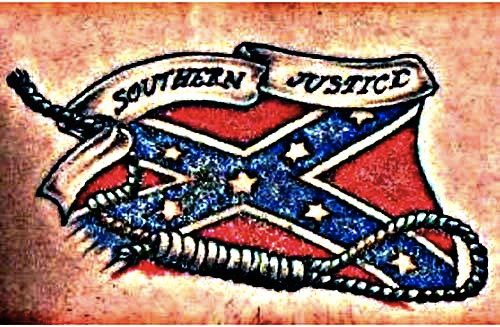Driving Old Dixie Down

Overnight, the Confederate flag has become poison. Major retailers are ceasing to sell it. Sen. Rand Paul of Kentucky (!) called it “inescapably a symbol of bondage and slavery,” and said it should be relegated to museums. South Carolina’s Republican governor, and its two Republican US Senators, have called for the flag to come down from the statehouse grounds.
Here’s why:
Liberal Yankees didn’t do this to the Confederate battle flag. Dylann Roof did. Look at that picture if you want to know who finally drove this flag from public life. That young man revered the Confederate flag and invested it with his devotion to white supremacy. He murdered nine black men and women in a Bible study, out of loyalty to what that flag represented to him. Maybe the flag represents something more noble to you. It is impossible for many of us to see the nobility through the blood stains on the floor of the Mother Emanuel AME, and through the curtain of strange fruit hanging from the poplar trees.
Ross Douthat has a great meditation on the topic of persecution and the black church, placing Dylann Roof’s evil deed in context of the long history of white supremacy’s targeting of black churches. Excerpts:
Which means that for white Christians facing whatever the American future holds, a debate like the one that’s happening around the Charleston massacre and Confederate flag right now is actually potentially very significant. It hints, at least, at a kind of crossroads for people, white conservative Christians, who thought of themselves as the core of America but who feel like they’re becoming more peripheral to the society that we’re becoming or moving toward.
On the one hand, that peripheral feeling could lead, as it sometimes has in the Obama era, to a kind of emergent white identity politics, a doubling down on whiteness-as-Americanness that marinates in its own dispossessed self-pity, a nationwide version of the Dixie ressentiment that, more than explicit racism, explains the enduring appeal of the stars-and-bars [Note from Rod: It’s actually the Confederate battle flag; the “Stars and Bars” is a different Confederate flag.].
On the other, the newfound feeling of being peripheral could encourage healing and outreach across the lines that have divided white Christians from their brethren in the past. This is what the Southern Baptist leader Russell Moore has in mind, I think, in his much-cited piece urging Christians to take down the Confederate battle flag. The point of doing so is not to make some sort of concession to political correctness or liberal pressure; it’s to extend a hand to the people whose ancestors were actually victimized, enslaved, and yes, persecuted as Christians by the culture and the civilization that went to war under that flag.
Yes. If it troubles you, white Southern Christian, to give up the Confederate battle flag, think of it as an act of sacrifice in solidarity with your fellow Christians who suffered and died, and who saw their churches burned down, at the hands of whites who acted in service of that flag’s ideals.
I have contempt for cheap theatrical stunts like Burn The Confederate Flag Day, gratuitous acts of protest that cost those who stage them nothing, but inflates their own egos with noxious eructations of moralistic flatulence. These are people who don’t want reconciliation or peace, only to rub the noses of angry people in their own defeat. However deserved that defeat may be, we don’t need any more hatred from sore culture-war winners.
Be of good cheer: the flag is coming down all over, and it’s coming down because Rand Paul is right: it is inescapably a symbol of bondage and slavery, and it is inescapably a symbol of white contempt for the humanity of black people. Who would have imagined that a skinny white supremacist punk would be the one who at long last drove Old Dixie down, and made the Confederate battle flag anathema, even to many Southern Republicans.
UPDATE: This is amazing:
“Our ancestors were literally fighting to keep human beings as slaves, and to continue the unimaginable acts that occur when someone is held against their will,” said [South Carolina] state Senator Paul Thurmond, a Republican, explaining that he would vote to remove the flag. “I am not proud of this heritage.”
His remarks were all the more notable since he is the son of Strom Thurmond, the former governor and United States senator who was a segregationist candidate for president in 1948.
At least one Republican said he wasn’t courageous enough to take a stand before, but the death of his friend Pinckney, who had served 19 years in the state House and Senate, changed that.
“I just didn’t have the balls for five years to do it,” said state Rep. Doug Brannon, who was elected in 2010.
“When my friend was assassinated for being nothing more than a black man, I decided it was time for that thing to be off the Statehouse grounds,” Brannon said. “It’s not just a symbol of hate, it’s actually a symbol of pride in one’s hatred.”
UPDATE.2: National Review editor Rich Lowry:
It shouldn’t be a surprise that Emanuel African Methodist Episcopal Church in Charleston, S.C., has taken an unspeakable crime and made it the occasion for an astonishing Christian witness.
In an unforgettable scene at the bond hearing last week for Dylann Roof, whose own uncle mused about flipping the switch for his execution after he gunned down nine people at an Emanuel Bible study, tearful family members of the victims told Roof that they forgive him and that he should repent. They were voices of love responding to hate, of unbelievable mercy and forbearance in the face of cruelty and murderous provocation, of an almost miraculous faith.
Next time you want to gripe about the place of Christians in the public square, my liberal and secularist friends, think of Mother Emanuel AME, and what its love has accomplished, and does accomplish every day.
